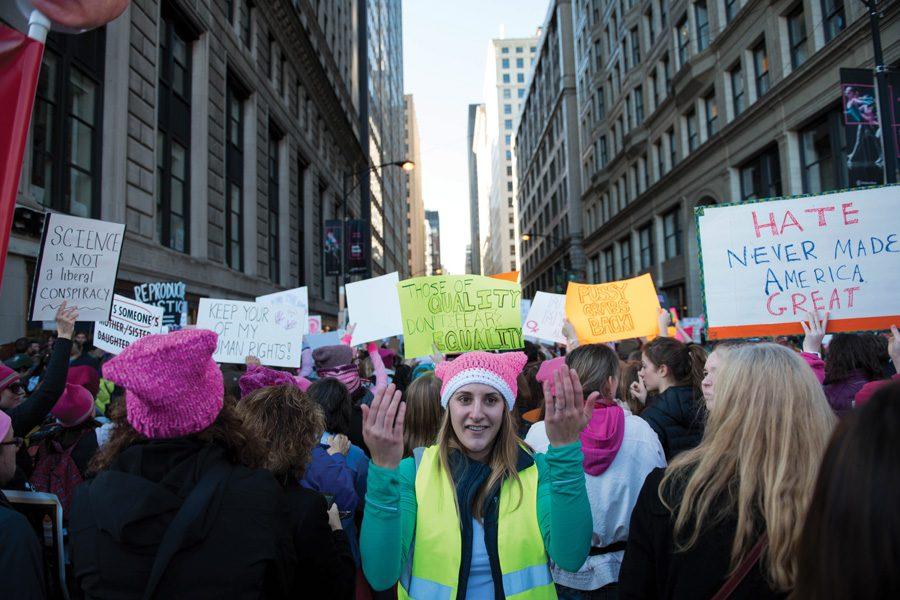Northwestern students join Women’s March on Washington, Chicago
(Katie Pach/Daily Senior Staffer) Demonstrators participate in the Women’s March on Chicago. Northwestern students traveled to both Chicago and Washington to engage in marches, which took place in cities around the world.
January 22, 2017
On Saturday, Camille Cooley had committed to attend a mandatory event for Alpha Phi Omega, her service fraternity, but canceled last minute to go to the Women’s March on Chicago instead.
“I felt, in 10 years, what am I going to remember more, and what’s more important to me?” the SESP junior said. “So I decided to cancel my event and go to the march instead.”
Cooley was one of numerous Northwestern students who traveled to Chicago and Washington for Women’s Marches on Saturday. The marches, which were held in cities across the country and world, protested the inauguration of President Donald Trump and advocated women’s and other marginalized people’s rights.
Cooley said she was excited to see how diverse issues were discussed and advocated at the march.
“One of the things I enjoyed most about the march was how intersectional it was,” Cooley said. “It wasn’t just about women’s rights. People had signs about education and gender rights, about unions, about Black Lives Matter.”
Sophia Swiderski traveled to Washington to march closer to the site of the inauguration. The Weinberg senior said the moment she stepped out of a Metro station and witnessed the mass of people gathered for the Women’s March on Washington was the most hopeful she had felt for this country since the election.
“There are so many people out there who feel exactly the way I do, who don’t want to go passively by,” Swiderski said. “Emerging from this subway station, I had this realization that this is the real America; this is our country; this is the people.”
Swiderski said after the election, she frequently heard that her liberal “image of America wasn’t the real America.” But she said participating in the march made her feel as though that wasn’t true.
The Women’s March on Washington, held the day after Trump’s inauguration, began with a rally at the National Mall at 10 a.m. and featured a variety of speakers. The march itself was planned to begin at 1:15 p.m., but parts of the crowd were stuck in gridlock for hours because so many people attended the event.
Swiderski said it was important to her that she be in the District for the march because she felt like the “streets of Washington had been taken away from us” in November following the election. She also said the fact that the attendance at the march overshadowed the attendance at the inauguration was “the biggest slap in the face we could give them right now.”
Trump tweeted Sunday morning expressing his disapproval of the marches.
“Watched protests yesterday but was under the impression that we just had an election! Why didn’t these people vote?” Trump wrote. “Celebs hurt cause badly.”
As of 11 a.m. Saturday, 275,000 people had taken trips on the city’s Metro system while only 193,000 trips had been taken as of that time on Inauguration Day, according to the Associated Press. A city official said march organizers estimated 500,000 in attendance at the Women’s March on Washington.
“There was just this sense of solidarity between all these different people who had felt marginalized by the recent election, who felt like they were the butt of these comments and jokes and treated like second-class citizens,” Swiderski said. “Everyone was together in the capital supporting each other. There are no words to describe how it felt.”
Other students took to packed Chicago Transit Authority trains to march in Chicago. Molly Benedict, director of Sexual Health and Assault Peer Educators, went to Chicago with other SHAPE members and also noted the high attendance. CTA trains were filled to the point she couldn’t move, Benedict said, and the bridges to Grant Park where speakers addressed marchers were so full they could not be crossed.
Benedict said she found the high turnout encouraging, especially after being distressed at Trump’s positions and proposals, which she said would “go against the progress people have been fighting for for years.”
“There’s so much hate … and people were saying we believe in peace,” the Weinberg senior said. “So I thought it was important to show up and keep showing up and keep fighting for those issues to show the administration that we still care and we’re not going to let things go backward easily.”
Email: [email protected]
Twitter: @kristine_liao
Email: [email protected]
Twitter: @matthewchoi2018


